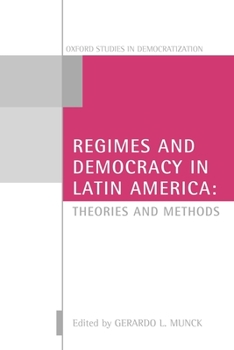Regimes and Democracy in Latin America: Theories and Methods
Select Format
Select Condition 
Book Overview
This volume focuses on democracy in Latin America and assesses the state of current knowledge on the topic and identifies new research frontiers in the study of Latin American politics. It provides an overview of research agendas and strategies used in the literature over the past four decades. It tackles a series of central questions--What is democracy? Is democracy an absolute value? Are current conceptualizations of democracy adequate? How and why does democracy work or fail in Latin America?--and spells out the implications of answers to these questions for current research agendas. It distinguishes between qualitative and quantitative approaches to the conceptualization and measurement of democracy, and presents a dataset on political regimes and democracy that illustrates how the differences between these two standard approaches might be overcome. Finally, it evaluates the strengths and weaknesses of conventional methods used to generate and test explanations of the causes and consequences of democracy, and proposes alternative ways to advance ongoing substantive debates given the current state of theory and data. The contributors are scholars from the United States and Latin America who are experts on Latin America, and who have established reputations as theorists and methodologists. The volume will be of interest to readers seeking to understand debates about democracy in developing societies and to grasp the concepts, theories and methods that are currently being developed to study Latin American politics.
Format:Paperback
Language:English
ISBN:0199219907
ISBN13:9780199219902
Release Date:June 2007
Publisher:Oxford University Press, USA
Length:304 Pages
Weight:1.01 lbs.
Dimensions:0.7" x 6.3" x 9.2"
Customer Reviews
0 rating





